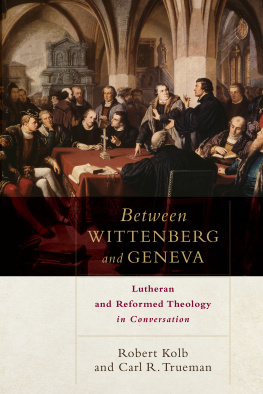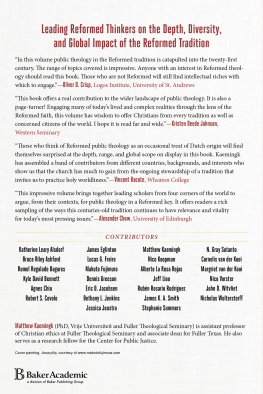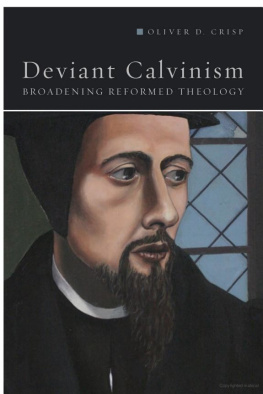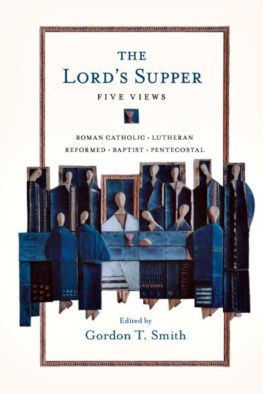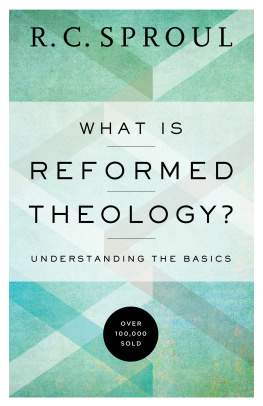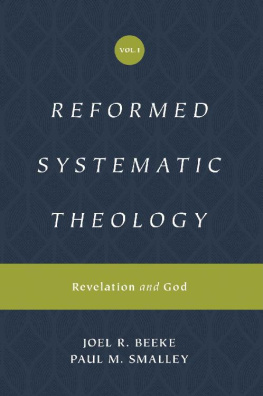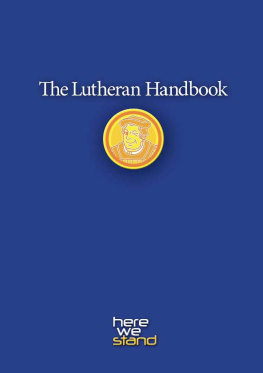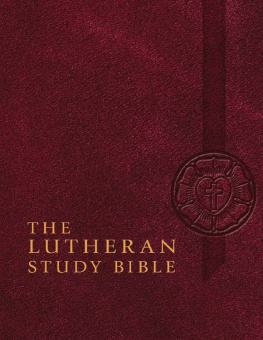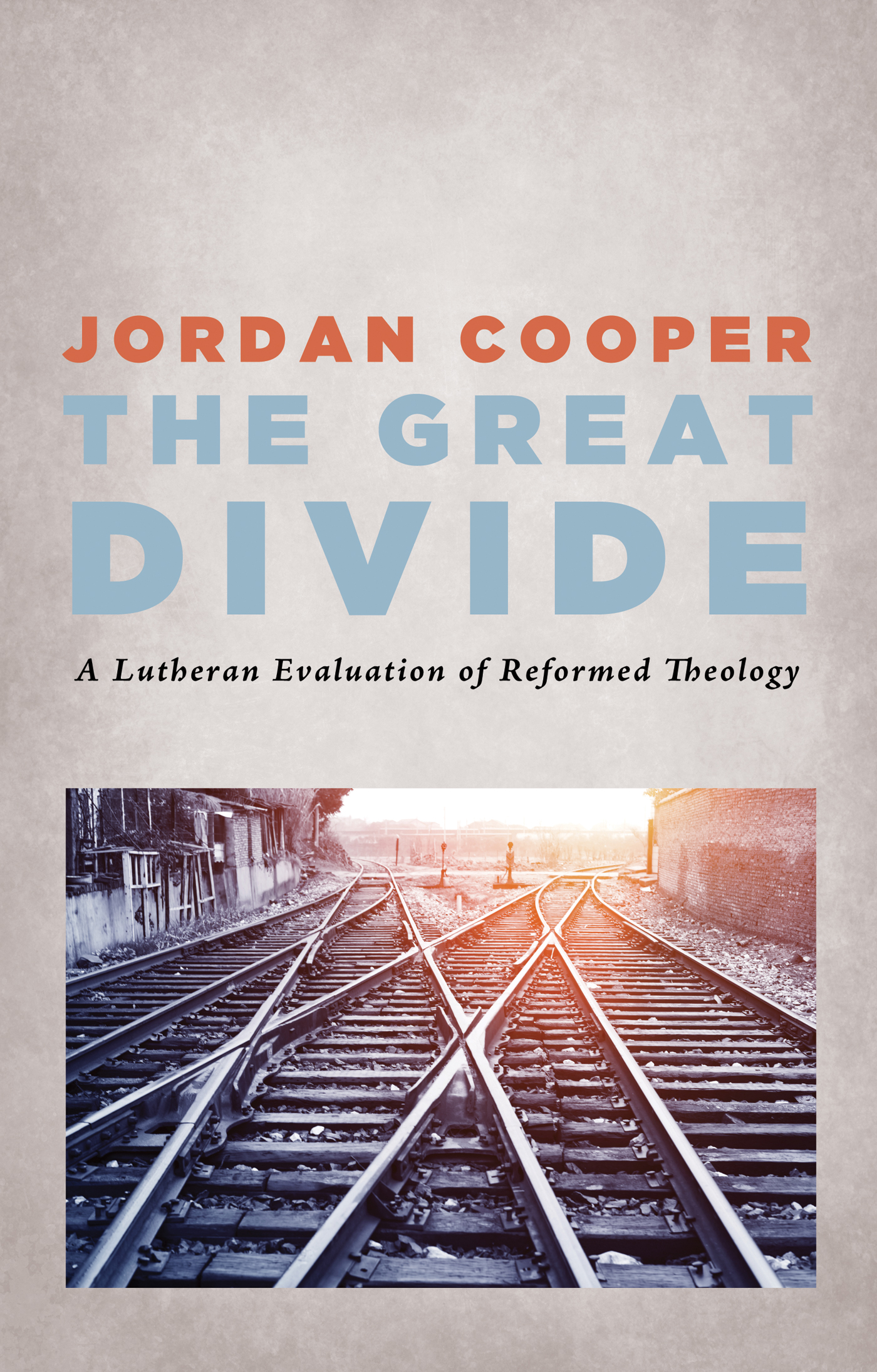Chosen in Christ
The Doctrine of Predestination
Predestination in the Reformed Tradition
F or some, the name John Calvin is associated with the teaching that God predestines everything that occurs in the universe, especially as regards salvation and damnation. Calvin is seen as a supporter of fatalism, a man with misplaced theocratic hopes, and even as a murderer.
John Calvin was highly influenced by the predestinarian theology of Augustine and Luthers treatise On the Bondage of the Will .
The Arminian conflict in many ways defined the Calvinist movement. The five points of Calvinism were formulated in response to Arminian protests and have become a popular means of confessing the teachings of the Calvinist Reformation.
The young Remonstrant movement ran into several difficulties with the necessity of agreeing with the Heidelberg Catechism and the Dutch Confession as a prerequisite for ordination. These documents contained unambiguous statements about Calvinistic predestination. In response to this, a petition was drawn which contained five points that defined Arminian theology: limited depravity, election based on foreseen faith, universal atonement, the resistible nature of grace, and the reality of apostasy.
In response to the five statements of the Remonstrants, the Dutch church convened a council in 1618 known as the Synod of Dort. At this synod, the Heidelberg Catechism was reaffirmed and the Arminian position was condemned as heretical. At first both ecclesiastical and governmental punishments were enacted against the Arminians; they were released from ordination and were banished from the country. There were even certain cases of more severe punishment. Eventually, toleration was promoted and the Arminians and Calvinists continued in their own diverging streams of theology.
Predestination in the Lutheran Tradition
Lutherans are more often than not left out of the discussion regarding predestination. It is common to hear Calvinism and Arminianism expressed as two alternative theological systems, to the neglect of a third option. The Lutheran approach to predestination serves as a mediating view between both Calvinistic particularism and Arminian free will theology. A biblical approach adopts both the Arminian insistence of the universal nature of Gods saving will, along with the Calvinist contention that salvation occurs sola gratia .
The history of the doctrine of election within the Lutheran church is a complex one. Martin Luther famously defended a monergistic understanding of predestination against the humanist Erasmus in his Bondage of the Will . Like Augustine before him, Luther argued that mans will is captive to sin. Of his own power, man is not able to come to faith. This election is a free gift without any foreseen merit or faith on the part of man.
After the death of Luther, the Lutheran party split into two primary factions. One was the Phillipist school, under the leadership of Melanchthon, and the other the Gnesio Lutheran party, under the leadership of Matthius Flacius. The Formula of Concord says of election that it is false and incorrect to teach that not only the mercy of God and the most holy merit of Christ but also something in us is a cause of Gods election, and for this reason God chose us for eternal life. For he had chosen us in Christ not only before we were born [Rom :], indeed before the foundation of the world (FC SD XI.). Thus, Luthers doctrine of both free will and predestination is defended. It is confessed that man is so affected by sin that faith is impossible apart from grace, and that election is unconditional.
The first great dogmatic text of the Lutheran scholastic period, Martin Chemnitzs Loci Theologici , defended the position outlined in the Confessions.
In the nineteenth century, predestination again became a subject of controversy within Lutheranism. American theologian and pastor C. F. W. Walther unintentionally found himself in a controversy over the issue of predestination.
Examining the Five Points of Calvinism
Though it may be somewhat simplistic to explain a Lutheran approach to election by examining the five points of Calvinism, it is a helpful means to organize the discussion around certain topics confessed in the Reformed tradition. The issues of both the extent of the atonement and the nature of perseverance have their own chapters in this present work; thus limited atonement and perseverance of the saints will not be discussed here.
Total Depravity
The first of the five points of Calvinism is total depravity. The Westminster Confession describes this doctrine as the concept that Man, by his fall into a state of sin, hath wholly lost all ability of will to any spiritual good accompanying salvation; so as a natural man, being altogether averse from that good, and dead in sin, is not able, by his own strength, to convert himself, or to prepare himself thereunto (WCF IX.). The phrase total depravity may lend itself to confusion; it seems to imply that the children of Adam are as depraved as is possible. However, as the Westminster Confession demonstrates, the proposal is not utter depravity (the view that people are as evil as they possibly could be), but that human depravity is so deep that it hinders one from approaching God apart from grace. Apart from grace, no human being would have faith; faith is a divine gift.
On this point, the Lutheran Reformation agrees. Luther confessed similar concerns to that professed in the first point of Calvinism. Article II of the Formula of Concord contains a lengthy discussion and defense of a Lutheran perspective on free will. The Confessions state,
That in spiritual and divine matters, the mind, heart, and will of the unreborn human being can in absolutely no way, on the basis of its own natural powers, understand, believe, accept, consider, will, begin, accomplish, do, effect, or cooperate. Instead, it is completely dead to the goodcompletely corrupted. This means that in this human nature, after the fall and before rebirth, there is not a spark of spiritual power left or present with which human beings can prepare themselves for the grace of God or accept grace as it is offered. (FC SD II.)
Along with the Reformed, the Lutheran Reformation confessed that apart from grace, all are in a state of spiritual death. It takes the divine work of God to cause one to repent and believe. Both repentance and faith are gifts from God, given by grace.
Though in agreement with the Reformed confessions of faith, there are some common Reformed explanations of depravity which go beyond that of the Lutheran Confessions. In the mid-eighteenth century, Jonathan Edwards published a much discussed work titled Freedom of the Will .
The Lutheran and Reformed traditions are in agreement regarding the nature of depravity and ones sinful state before God. For both, the extent of sin negates the possibility of faith and repentance apart from an act of grace. However, the popular explanation of Edwards of the nature of bondage and freedom adopted by many Reformed writers goes beyond the Lutheran approach by adopting pure determinism and addresses an issue not intended by Lutheran discussions of bondage and free choice.
Unconditional Election
The second point in the Calvinistic system is unconditional election. This is the teaching that predestination is an unconditional act. Gods act of choosing people for salvation, therefore, is not in view of future faith or merit but is the cause of future faith and good works. In eternity past, God chose specific individuals unto salvation. The Canons of Dort express the idea with the following words:


